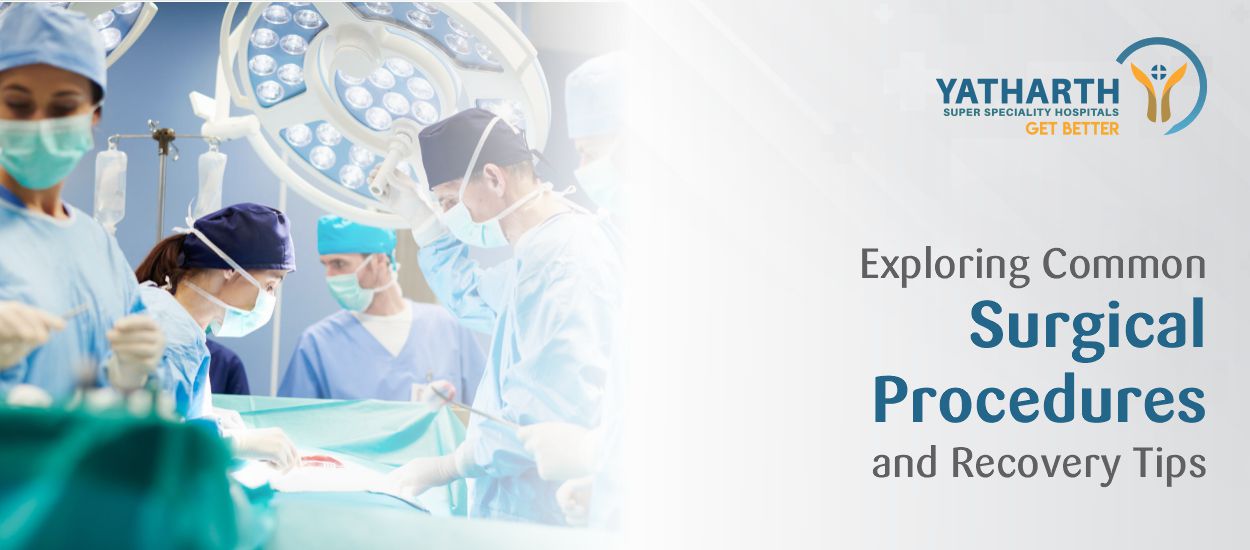Exploring Common Surgical Procedures and Recovery Tips
This blog will explore common surgical procedures, discuss how to prepare for surgery, delve into......
Read MoreUndergoing surgery can be a mentally taxing and, in many cases, a terrifying experience. After all, it might be a new journey for you and your family, leaving you uncertain about what lies ahead.
Preparation is the most important aspect of a successful surgery. This phase focuses on ensuring your physical and mental readiness for the surgery.
After your surgery is scheduled, a nurse will contact you to discuss your plan of care. This includes a visit to a PAC, which could be at a medical centre like Yatharth Super Speciality Hospitals.
During your visit to PAC, healthcare professionals will dive deep into any medical concerns you may have. This is an important time to openly discuss your health history, existing conditions, allergies, and all medications you're currently taking. You'll also receive specific, detailed instructions on how to prepare for your surgery.
Before your surgery starts, you'll be advised to choose a trusted support person. This person plays a vital role throughout your surgical journey. They will be providing you emotional support, help you with pre-surgery preparations, and transportation after your surgery. For your safety, you will not be permitted to drive yourself home following the procedure due to the effects of anaesthesia and pain medication which will make it harder for you to drive yourself back home.
The Day of Your Surgery
Before you knew, it was time for your surgery and there are a few things which will happen to get you ready for it.
On the morning of your surgery, leave all valuables, such as expensive jewellery or large sums of cash, safely at home and not bring them with you for your own sake of mind. However, you will be asked to bring a valid photo ID for check-in. Your support person will be responsible for driving you to the hospital.
In the pre-operation area, you'll change into a hospital gown with the help of the nurses if required. Nurses will review your medical information and confirm your identity, the surgical procedure, and its location multiple times before the surgery starts. This might seem repetitive for you, but it's a critical safety measure to reduce the chance of any error. An intravenous (IV) line will be started, usually in your arm, to administer fluids and medications during and after the surgery.
Once you are in the operating room, the surgical and anaesthesia teams will take over, making sure that your comfort and safety is prioritised.
After you are sedated and numb, the nursing team may place a catheter in your bladder if needed. This is typically done if your surgery is expected to last many hours or if your surgeons think that you will need one for some time after surgery. While operating rooms are generally kept cool for sterile reasons, your team will take measures to keep you as warm and comfortable as possible, often providing you with forced-air warming blankets or warmed fabric blankets. You will be unconscious and feel nothing during the whole procedure.
Once your surgery is complete, the focus shifts to your recovery and managing any discomfort.
After your surgery is completed, you will be carefully moved to the PACU. Here, you will be under the direct care of nurses who are trained in caring for patients like you, recovering from surgery and anaesthesia. In some cases, if your condition requires more intensive monitoring and care, you may be transferred directly to the Intensive Care Unit (ICU) after surgery.
While we strive to help you manage your pain as effectively as possible, it is important to understand that experiencing some discomfort is a normal part of the surgical healing process. Our dedicated pain specialists will work closely with you and your doctor to develop a personalised pain management plan.
Surgeries can be terrifying but it can be approached with greater confidence when you are well-informed. This detailed guide contains most of the information you’ll be needing for your surgical journey from your initial preparations and hospital arrival to the after surgery recovery phase. By understanding what’s going to happen at each stage, you can feel more prepared, in control, and focused on healing while keeping your mind at ease. Remember, discomfort is a normal part of the surgical healing process, and your healthcare team is dedicated to supporting your comfort and recovery every step of the way.

This blog will explore common surgical procedures, discuss how to prepare for surgery, delve into......
Read More
Hernias are common medical conditions that affect millions of people worldwide. Despite their......
Read More
Laparoscopic or “keyhole” surgery is transforming patient care by reducing recovery time,......
Read More